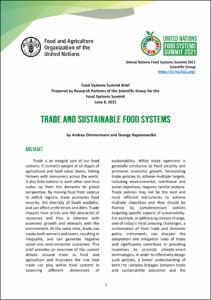Zimmermann, Andrea; Rapsomanikis, George: Trade and Sustainable Food Systems : Food Systems Summit Brief Prepared by Research Partners of the Scientific Group for the Food Systems Summit June 8, 2021.
Online-Ausgabe in bonndoc: https://doi.org/10.48565/scfss2021-zq03
Online-Ausgabe in bonndoc: https://doi.org/10.48565/scfss2021-zq03
@article{handle:20.500.11811/9186,
doi: https://doi.org/10.48565/scfss2021-zq03 ,
author = {{Andrea Zimmermann} and {George Rapsomanikis}},
title = {Trade and Sustainable Food Systems : Food Systems Summit Brief Prepared by Research Partners of the Scientific Group for the Food Systems Summit June 8, 2021},
publisher = {Center for Development Research (ZEF) in cooperation with the Scientific Group for the UN Food System Summit 2021},
year = 2021,
month = jun,
note = {Trade is an integral part of our food systems. It connects people at all stages of agricultural and food value chains, linking farmers with consumers across the world. It also links nations to each other and thus scales up from the domestic to global perspective. By moving food from surplus to deficit regions, trade promotes food security, the diversity of foods available, and can affect preferences and diets. Trade impacts food prices and the allocation of resources and thus is inherent with economic growth and interacts with the environment. At the same time, trade can create both winners and losers, resulting in inequality, and can generate negative social and environmental outcomes. This brief provides an overview of the current debate around trade in food and agriculture and illustrates the role that trade can play within food systems in balancing different dimensions of sustainability. While trade openness is generally conducive to food security and promotes economic growth, formulating trade policies to achieve multiple targets, including environmental, nutritional and social objectives, requires careful analysis. Trade policies may not be the best and most efficient instruments to achieve multiple objectives and they should be framed by complementary policies targeting specific aspects of sustainability. For example, in addressing climate change, one of today’s most pressing challenges, a combination of food trade and domestic policy instruments can sharpen the adaptation and mitigation roles of trade and significantly contribute in providing incentives to promote climate-smart technologies. In order to effectively design such policies, a better understanding of both the complex linkages between trade and sustainability outcomes and the simultaneous impacts of policy approaches on all parts of the food system will be necessary.},
url = {https://hdl.handle.net/20.500.11811/9186}
}
doi: https://doi.org/
author = {{Andrea Zimmermann} and {George Rapsomanikis}},
title = {Trade and Sustainable Food Systems : Food Systems Summit Brief Prepared by Research Partners of the Scientific Group for the Food Systems Summit June 8, 2021},
publisher = {Center for Development Research (ZEF) in cooperation with the Scientific Group for the UN Food System Summit 2021},
year = 2021,
month = jun,
note = {Trade is an integral part of our food systems. It connects people at all stages of agricultural and food value chains, linking farmers with consumers across the world. It also links nations to each other and thus scales up from the domestic to global perspective. By moving food from surplus to deficit regions, trade promotes food security, the diversity of foods available, and can affect preferences and diets. Trade impacts food prices and the allocation of resources and thus is inherent with economic growth and interacts with the environment. At the same time, trade can create both winners and losers, resulting in inequality, and can generate negative social and environmental outcomes. This brief provides an overview of the current debate around trade in food and agriculture and illustrates the role that trade can play within food systems in balancing different dimensions of sustainability. While trade openness is generally conducive to food security and promotes economic growth, formulating trade policies to achieve multiple targets, including environmental, nutritional and social objectives, requires careful analysis. Trade policies may not be the best and most efficient instruments to achieve multiple objectives and they should be framed by complementary policies targeting specific aspects of sustainability. For example, in addressing climate change, one of today’s most pressing challenges, a combination of food trade and domestic policy instruments can sharpen the adaptation and mitigation roles of trade and significantly contribute in providing incentives to promote climate-smart technologies. In order to effectively design such policies, a better understanding of both the complex linkages between trade and sustainability outcomes and the simultaneous impacts of policy approaches on all parts of the food system will be necessary.},
url = {https://hdl.handle.net/20.500.11811/9186}
}






